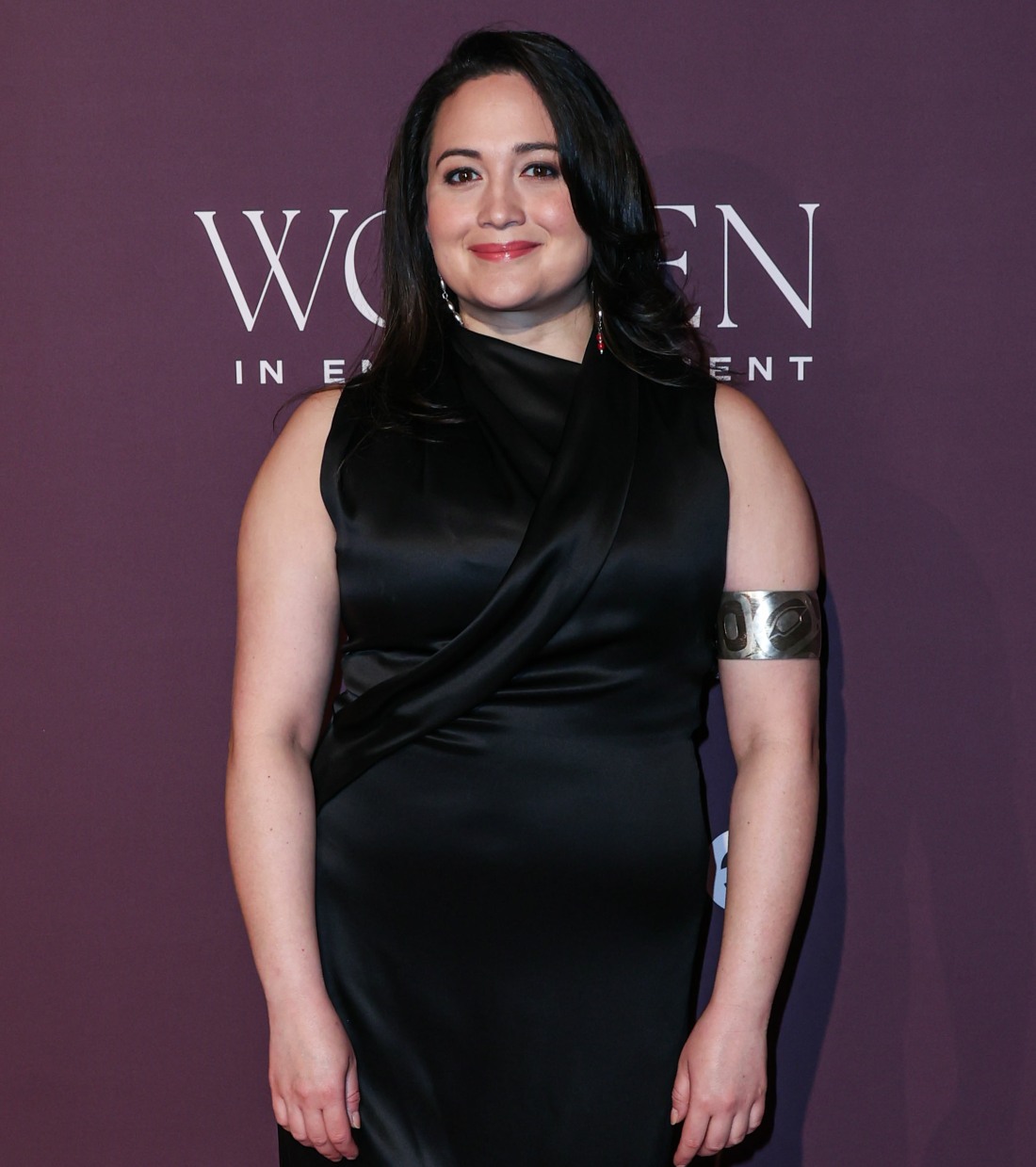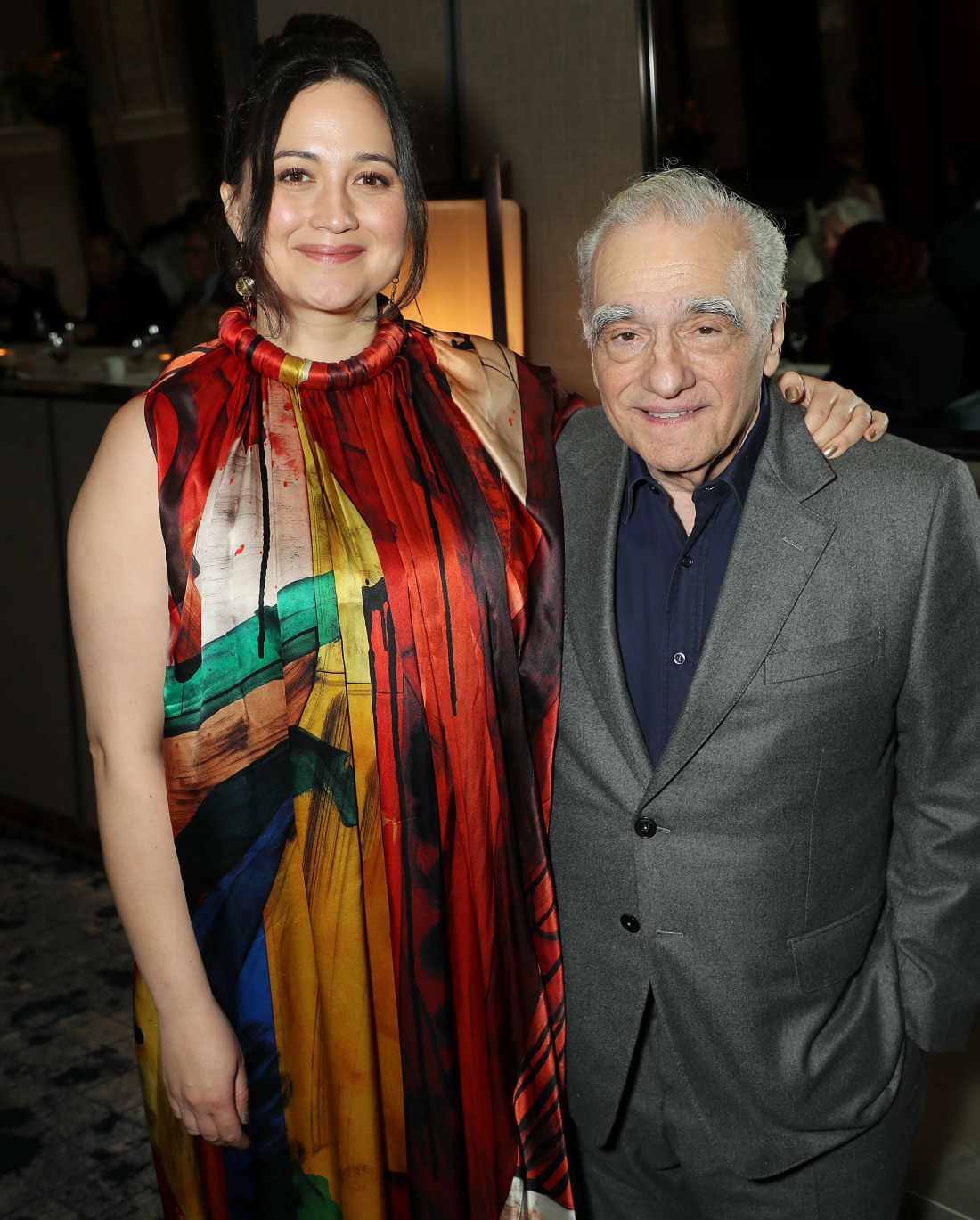Lily Gladstone has been nominated across the board for all of the Best Actress awards for her performance in Killers of the Flower Moon. The film came out during the SAG strike, so Lily didn’t really get a chance to do a big promotional tour. As such, it feels like we’re still finding out big chunks of her personal biography, information which usually would have been front-and-center in her first KOTFM interviews. For example, Lily uses both “she” and “they” pronouns. Her rationale is really interesting, and it relates to Native American culture and language.
Lily Gladstone is opening up about pronoun preferences. In an interview with PEOPLE, the Killers of the Flower Moon star, 37, explains why she feels comfortable being referred to as both she and they.
“I remember being 9 years old and just being a little disheartened, seeing how often a lot of my boy cousins were misgendered because they wore their hair long,” explains Gladstone, who has Blackfeet and Nez Perce heritage. She was raised on the Blackfeet reservation in Montana for the first decade of her life.
“It happens to a lot of kids, I think, especially Native boys leaving a community where long hair is celebrated [and then] just kind of getting teased for it,” continues Gladstone, whose profile on X also mentions she/they pronouns. “So I remember back then being like, everybody should just be they. And in most Native languages, most Indigenous languages, Blackfeet included, there are no gendered pronouns. There is no he/she, there’s only they,” Gladstone adds.
“It doesn’t happen as much anymore, but there’ve been several times in my life where I’ve been speaking to a northern Cheyenne-first language speaker [or another] Indigenous-first language speaker where they’ll accidentally misgender you when they’re talking to you,” says Gladstone. “And then they’ll get embarrassed about it, but it’s because they’ve learned English later.”
“So Blackfeet, we don’t have gendered pronouns, but our gender is implied in our name. But even that’s not binary,” says Gladstone, adding that her grandfather’s Blackfeet name meant “Iron Woman.” “He had a name that had a woman’s name in it. I’d never met my grandfather. I wouldn’t say that he was nonbinary in gender, but he was given a woman’s name because he kind of carried himself, I guess, the way that women who have that name do. And there were lots of women historically and still now who are given men’s names. They fulfill more of a man’s role in society as far as being provider, warrior, those sort of things,” she says.
“So, yeah, my pronoun use is partly a way of decolonizing gender for myself.”
Gladstone adds that her pronoun use is a way of “embracing that when I’m in a group of ladies, I know that I’m a little bit different. When I’m in a group of men, I don’t feel like a man. I don’t feel [masculine] at all. I feel probably more feminine when I’m around other men.”
As far as gendered awards categories that separate actor and actress, Gladstone, who is nominated for best actress at the Golden Globes and Critics Choice Awards, has nuanced feelings. “I think it’s really cool that we’re seeing ‘performer’ and we’re seeing everybody brought in together. I do feel that historically having gendered categories has helped from keeping women actors from a lot of erasure because I think historically people just tend to honor male performances more. I know a lot of actresses who are very proud of the word ‘actress’ or are very proud of being an actress. I don’t know, maybe it’s just an overly semantic thing where I’m like, if there’s not a ‘director-ess,’ then there shouldn’t be actresses. There’s no ‘producer-ess,’ there’s no ‘cinematographer-ess.’ ”
There have been several conversations recently about gendered awards categories, with Emma Corrin saying that they don’t feel like they should be relegated to “actress” categories. I appreciate that Lily is pointing out the obvious – that the second any awards show makes their categories genderless, only men will be nominated. Which is why 99% of the director, cinematographer and producer nominations DO go to men, because those categories are already genderless. So, just at a representation level, I do think the actor categories should be gendered. But I also think the conversations are interesting, and Lily makes some interesting points about language and decolonizing gender.
Photos courtesy of Avalon Red, Cover Images.
- BEVERLY HILLS, LOS ANGELES, CALIFORNIA, USA – DECEMBER 07: American actress Lily Gladstone arrives at The Hollywood Reporter’s Women In Entertainment Gala 2023 presented by Lifetime held at The Beverly Hills Hotel on December 7, 2023 in Beverly Hills, Los Angeles, California, United States.,Image: 827732185, License: Rights-managed, Restrictions: , Model Release: no, Pictured: Lily Gladstone, Credit line: Xavier Collin / Image Press Agency / Avalon
- ‘Killers of the Flower Moon’ FYC Screening and Luncheon at The Pool. The film is now playing in theatres around the world, including IMAX Featuring: Lily Gladstone Where: New York, New York, United States When: 29 Nov 2023 Credit: Marion Curtis/StarPix for Apple/startraksphoto.com
- ‘Killers of the Flower Moon’ FYC Screening and Luncheon at The Pool. The film is now playing in theatres around the world, including IMAX Featuring: Lily Gladstone and Martin Scorsese Where: New York, New York, United States When: 29 Nov 2023 Credit: Marion Curtis/StarPix for Apple/startraksphoto.com
















I’m so pissed that Emma Stone is considered the frontrunner for winning Best Actress. It should be Lily who wins. Lily had all this momentum and then Emma started doing shady indirect promo for Poor Things during the strike, and lo and behold, she’s gonna get her SECOND Oscar. Figures.
Don’t get me started on how much I detest that Emma Stone movie. I’m Team Lily all the way.
Meaning no disrespect, I’m genuinely curious why you detest Poor Things? I saw it and thought it was an absolute masterpiece: thought-provoking, creative, funny and original. I also thought Emma is amazing in it. I mean I do get all the love for Lily Gladstone but KOTFL was not a great movie, IMHO.
The message of Poor Things: men and lots of sex free women to be their true selves. Congratulations if you got more out of it than that. Cinematically it may be a masterpiece. Thematically it’s misogynistic and regressive. Oh, and I thought ES demeans herself in it.
I absolutely intensely disliked Poor Things–everything about it. Mark Ruffalo’s accent waned in and out. He deserves a razzie. The story was lame and misogynistic.
I haven’t seen it so I cannot comment on the cinematic value of it.
However, the theme is deeply misogynistic (a woman with a child’s brain who is available for sex with everyone) and I don’t think I’m tempted to see it either.
If Emma gets another Oscar I’m going to scream, I thought that her performance in La La Land wasn’t that great either.
I loved Poor Things – it’s a visual feast, super weird, often hilarious, and kept me thinking about it for days. I didn’t find it misogynistic at all. It’s not about a woman with a baby brain being taken advantage of by men. She was a woman who could not be contained by the men who tried to do so. She made an unconventional journey of self-discovery unencumbered by cultural/societal expectations. And she eventually brought them all to heel. I don’t get why everyone thinks she had no agency.
I don’t know, I thought Emma Stone was wonderful in Poor Things. I really enjoyed it and didn’t think it was particularly misogynistic? But definitely respect other people’s interpretations. I’m glad Mark Ruffalo got “snubbed” though because I thought his performance was very meh with dodgy/strange accent work. But Willem Dafoe was predictably wonderful; I’m sad he got passed over in the Supporting Actor.
That said, I am definitely pushing for Lily to win (even if her role strikes me more as supporting, sorry! Just my opinion). It’s high time an indigenous person took home gold at the Oscars.
More of this. In Brasil, I grow up in front of a candomble terreiro, a temple for the worship of the african orishas. Because of that, transgender never phased me and the whole conversation around “biology” genders is crazy to me. People were just people there. Men could be women too. It was all good and not a problem.
This is the way.
It is!!
(So great to see Mando’s quote here too).
These are all excellent points.
As a Sexuality Studies professor, I also want to point out that all the arguments about biology in gender “debates” baffle me.
Biology is perhaps one of the strongest bits of evidence that gender is NOT binary!
There is SO much variation in human gender from a biological standpoint.
(See, for example, any of the numerous conditions that can lead to being “intersex,” which has been acknowledged medically for centuries; the wide variance in hormones, brain chemistry affecting gender/biological sex, and even external genitalia size among humans, etc., and there are many more possible examples)
When people claim biology is evidence of two genders, they are forcing huge amounts of biological variance into two arbitrarily divided categories, to pretend there are just two options. It’s ludicrous.
I love her. She just radiates beauty and you can just see what a genuine and special soul she is in every picture. I hope she wins.
Yes. Radiant is the perfect word for her. And her comments are really informative and thoughtful.
I can’t stand Leonardo DiCaprio (something about his voice has always been nails on a chalkboard for me) so I won’t see KOTFM. Excited to see whatever she does next!
I love Lily! She is so thoughtful. Also, I’ve loved all of her fashion this season.
Interesting gender discussion. One factoid I learned working in Hawaii, Hawaiian names are not gendered. I was trying to think of a way to know ahead of time should I use he or she but then was told, no, there’s no gender to the names. Now I realize, of course, I should have just used they until/unless I learned otherwise.
I’m so sick of this conversation . And sadly, many of the people who claim to be opposed to gender ideology or gender norms or whatever are absolutely reinforcing them. We should be expanding what it means to be a man or a woman not further restricting them. Lily isn’t doing this but there a lot of cis white hetero women and other cis hetero women talking about they don’t feel like or a identify as women because they don’t like dresses or some dumb stuff like that.
Lily makes a good point about Native culture but at the same time while most languages don’t have gendered pronouns there were gender norms and traditional gender roles that varied from tribe to tribe.
Really interesting conversation to be had here about why no “director-ess” etc categories while actors are separated.
I wonder if this came from many movies having a male and female lead (especially back when the Oscars started and movies were often romance stories), so it made sense to have those two categories.